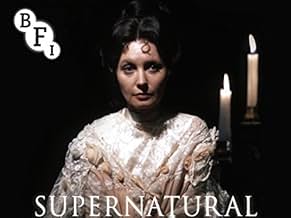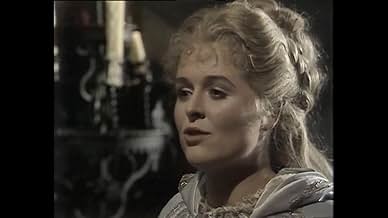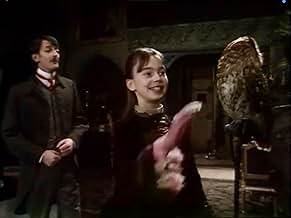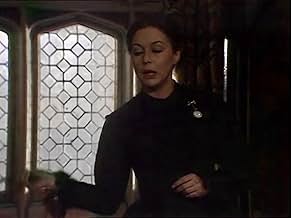Ajouter une intrigue dans votre langueChilling anthology series where membership to the secret society, The Club of the Damned, is granted through telling horror stories.Chilling anthology series where membership to the secret society, The Club of the Damned, is granted through telling horror stories.Chilling anthology series where membership to the secret society, The Club of the Damned, is granted through telling horror stories.
Parcourir les épisodes
Avis en vedette
Absolutely brilliant old BBC TV. This is the BBC during it's height, Golden Age Doctor Who, I Claudius, the M.R. James ghost stories, and it should be much more widely known. It features perhaps the creme de la creme of British acting talent at the time (Jeremy Brett, Billie Whitelaw, Robert Hardy, Denholm Elliott, Gordon Jackson - oh the cast is to die for!). Such was the talent avaliable at that time that each and every one of the main cast elevate the whole seriese far above what otherwise could have been fairly standard pop-horror, producing a real weight of gravitas and experience to the roles. The stories too however, are brilliant, I struggle really to pin point the best of the bunch, as I love them all. I have a certain soft spot for lurid, Victorianna-esque Gothic horror, I'm a sucker for it, so I'd probably like any of it. But "Night of the Marionettes" is especially good, due to the stark, amazing theatrical vivid quality to it with the genuinely unsettling marionette puppet show, shot on film as well, giving it a great, grimy, raw quality. I love also the two partner, "Countess Ilona" and "The Werewolf Reunion", largely because of the amazing cast surrounding it. A sordid collection of aristocratic monsters, Charles Kay playing a sneering snob who is little more than a grotesque sex pest, the other (played by Ian Hendry) an nihilistic war profiteer who booms his majestic voice across the hall espousing his beautiful misanthropic poetry, denouncing everything from religious faith to humanitarianism to peace, in between chuckling and stuffing his face perpetually with food. To the stuffy and uptight politician (Edward Hardwicke) a man so seemingly inhuman and robotic he feels more like an extension of the cold, glassy monocle he polishes repeatedly. Along with the foppish pianist played by Hugo Hoffman, they each get a gruesomely delicious fate, and it sparkles watching these actors, the peak of British acting talent bounce of one another, each unique in their personalities and personal philosophies, yet each acting like a kind of reflection of one another, all representatives of the casual culture of distain for humanity and disregard for women that marks this Prussian culture of aristocratic degeneracy and back stabbing grubby reactionarism.
Jeremy Brett too deserves special praise in "Mr. Nightingale". The story itself is very peculiar, yet he absolutely shines, doing what he would later master as Sherlock Holmes, every line shot out of his mouth like bullets from a Gatling gun, his teeth baring, his eyes bulging. He's just brilliant in how bizarre and malignant he can be.
The writing is also superb. It's very, very mid 70s BBC (anyone who watches Doctor Who or I, Claudius at the time will know exactly what I mean). Lots of harsh looking video, flare bulbs from bright lights, small sets like theatre, minimal camera movements, static shots of one or two actors. But I have to say It's brilliant for this series, the often highly loquacious dialogue being allowed to simply flow from the brilliant actors hired, allowing the poetic nature of it to drive the story. Atmosphere and tension and personal drama are at the forefront, not special effects (which, knowing the quality of some of that at the time, was probably wise).
It's a lost gem in my opinion, and should be far more widely known. I regularly rewatch it with a smile on my face, delighted by the weird cast of ghouls who come to recite their stories, diverse in their range and setting (and even period).
Jeremy Brett too deserves special praise in "Mr. Nightingale". The story itself is very peculiar, yet he absolutely shines, doing what he would later master as Sherlock Holmes, every line shot out of his mouth like bullets from a Gatling gun, his teeth baring, his eyes bulging. He's just brilliant in how bizarre and malignant he can be.
The writing is also superb. It's very, very mid 70s BBC (anyone who watches Doctor Who or I, Claudius at the time will know exactly what I mean). Lots of harsh looking video, flare bulbs from bright lights, small sets like theatre, minimal camera movements, static shots of one or two actors. But I have to say It's brilliant for this series, the often highly loquacious dialogue being allowed to simply flow from the brilliant actors hired, allowing the poetic nature of it to drive the story. Atmosphere and tension and personal drama are at the forefront, not special effects (which, knowing the quality of some of that at the time, was probably wise).
It's a lost gem in my opinion, and should be far more widely known. I regularly rewatch it with a smile on my face, delighted by the weird cast of ghouls who come to recite their stories, diverse in their range and setting (and even period).
I too vaguely remembered this from my childhood (even though none of my mates of the same age do) - specifically, images of a man with white eyes laughing creepily and a coffin full of maggots, both of which caused me a few sleepless nights as a 9 year old. I knew it was screened once in 1977 and never again, but all other information (especially in the pre-internet days) was scant to say the least. After a long, long search, I recently tracked down a copy of the complete series and, with the organ music and images of gargoyles on the titles just as I remembered them, I settled down to a nostalgia fuelled extravaganza.
So is this series some lost masterpiece? Sadly no. The few remembered images I mentioned above all come from the last episode 'Dorabella' which is the best of the lot by a country mile and is an offbeat vampire story with a genuinely creepy atmosphere. The rest are rather hit and miss, and at 50 minutes each, some of the extremely flimsy stories stretch well past breaking point. This is especially noticeable in the two part 'Countess Ilona/Werewolf Reunion' which could easily have been done and dusted in 30 minutes flat. At virtually 2 hours, it's almost unbearable.
Although it features a veritable who's who of British TV stars of the 70's (Billie Whitelaw, Ian Hendry, Robert Hardy, Gordon Jackson, Leslie Ann Down et al), production values on the series are noticeably low, with all the action happening in one or two sets per episodes and with the camera virtually fixed in one place. There isn't much in the way of a suspenseful soundtrack, and any sudden close ups or panned shots are invariably accompanied by an over the top blast of organ music. The stilted dialogue is rather wooden and pretentious too; the writer (Robert Muller) seems to have aspirations toward the MR James end of the horror market but sadly, his talent seems to suggest more of a Clive James, but without the wit.
Ultimately, the series is worth sitting through on it's own merits, and these just about drag it above the curiosity/novelty value of watching a long forgotten series, but I can't imagine anyone wanting to sit through them all again.
So is this series some lost masterpiece? Sadly no. The few remembered images I mentioned above all come from the last episode 'Dorabella' which is the best of the lot by a country mile and is an offbeat vampire story with a genuinely creepy atmosphere. The rest are rather hit and miss, and at 50 minutes each, some of the extremely flimsy stories stretch well past breaking point. This is especially noticeable in the two part 'Countess Ilona/Werewolf Reunion' which could easily have been done and dusted in 30 minutes flat. At virtually 2 hours, it's almost unbearable.
Although it features a veritable who's who of British TV stars of the 70's (Billie Whitelaw, Ian Hendry, Robert Hardy, Gordon Jackson, Leslie Ann Down et al), production values on the series are noticeably low, with all the action happening in one or two sets per episodes and with the camera virtually fixed in one place. There isn't much in the way of a suspenseful soundtrack, and any sudden close ups or panned shots are invariably accompanied by an over the top blast of organ music. The stilted dialogue is rather wooden and pretentious too; the writer (Robert Muller) seems to have aspirations toward the MR James end of the horror market but sadly, his talent seems to suggest more of a Clive James, but without the wit.
Ultimately, the series is worth sitting through on it's own merits, and these just about drag it above the curiosity/novelty value of watching a long forgotten series, but I can't imagine anyone wanting to sit through them all again.
10alsmess
There was at one time a tradition of late night horror that seemed to abound in the seventies in Britain.This is an episodic collection of tales linked together by the telling at a club of the damned.Ghosts,vampires and werewolves alongside other nightmarish scenarios (creepy Victorian dolls anyone?) and an interesting take on the Frankenstein story feature.This is what the BBC does best. Well written, intelligent and well acted stories.
A vague childhood memory of creepy organ music and a lizard and a big house. Somehow these elements do make sense more than 40 years later now that I view Supernatural again. I was surprised to learn that only 8 episodes were made . Of uneven quality, yes. Studio bound ..yes. But convincing sets and the contrivance of the stories taking place in confined indoor locations makes the lack of location shooting immaterial . My first revisit to these episodes was the one with Gordon Jackson and the Marionettes. What a good actor he was and the acting is first rate on all the episodes I have so far revisited. Ian Hendry and Billie Whitelaw also give stand out performances in my view. It seems a shame that these performances have been hidden away for so long . Worth watching just to see these actors again in contexts that are not the ones we most commonly see them in on the oft repeated shows . Gordon Jackson after all , was not just Mr Hudson or overseeing the antics of Bodie and Doyle ! These stories are slow by today's editing standards but serve as showcases for the talents we alas miss . If you like the old gothic classics and prefer horrors which are implied rather than shown in CGI ( which is rarely convincing anyway ) , you could give this short series a try.
The richly Gothic sounding organ music of Poulenc set to images of gargoyles tells you what kind of series this is. The sort they don't make any more. "Supernatural" is a series for people who may enjoy reading old Gothic horror short stories or the original novels "Dracula" and "Frankenstein". Not for those who like today's style of horror movie. Beneath the horror fantasy "Supernatural" may as well be called "Unnatural" as it focuses on Victorian sexual repression almost as much as it pays homage to Mary Shelley, Sheridan Le Fanu etc.
A little peaceful time to yourself is essential if you really want to escape into this slow building wordy world of sinister misty nights. Join the Club of the Damned,or at least damned good actors achieving mixed results. Two episodes are much too peculiar and addled (like "Mr Nightingale" - ear-trumpets and all - too boring). "Mr Nightingale" and the one with Denholm Elliot would make the M.R. James "Ghost Stories For Chritmas" look modern and sexy. However Billie Whitelaw is so beautiful, elegant and lethal in the two-parter "Countess Ilona" and "Werewolf Reunion"."Night of the Marionettes" is worth seeing with Gordon Jackson and Pauline Moran on the trail of Mary Shelley(in which Sdyney Bromley, the little actor who whees up the wall as the Porter in Polanski's MacBeth, adds to the tone). You'll be trying to place the mysterious looking actor Vladek Sheybal too - ("From Russia With Love").
"Dorabella" is another atmospheric piece of escapism before bedtime. If you have a lot of patience!
There are some nice twists regarding some of the storytellers.
Join the club.
A little peaceful time to yourself is essential if you really want to escape into this slow building wordy world of sinister misty nights. Join the Club of the Damned,or at least damned good actors achieving mixed results. Two episodes are much too peculiar and addled (like "Mr Nightingale" - ear-trumpets and all - too boring). "Mr Nightingale" and the one with Denholm Elliot would make the M.R. James "Ghost Stories For Chritmas" look modern and sexy. However Billie Whitelaw is so beautiful, elegant and lethal in the two-parter "Countess Ilona" and "Werewolf Reunion"."Night of the Marionettes" is worth seeing with Gordon Jackson and Pauline Moran on the trail of Mary Shelley(in which Sdyney Bromley, the little actor who whees up the wall as the Porter in Polanski's MacBeth, adds to the tone). You'll be trying to place the mysterious looking actor Vladek Sheybal too - ("From Russia With Love").
"Dorabella" is another atmospheric piece of escapism before bedtime. If you have a lot of patience!
There are some nice twists regarding some of the storytellers.
Join the club.
Meilleurs choix
Connectez-vous pour évaluer et surveiller les recommandations personnalisées
- How many seasons does Supernatural have?Propulsé par Alexa
Détails
Contribuer à cette page
Suggérer une modification ou ajouter du contenu manquant



































